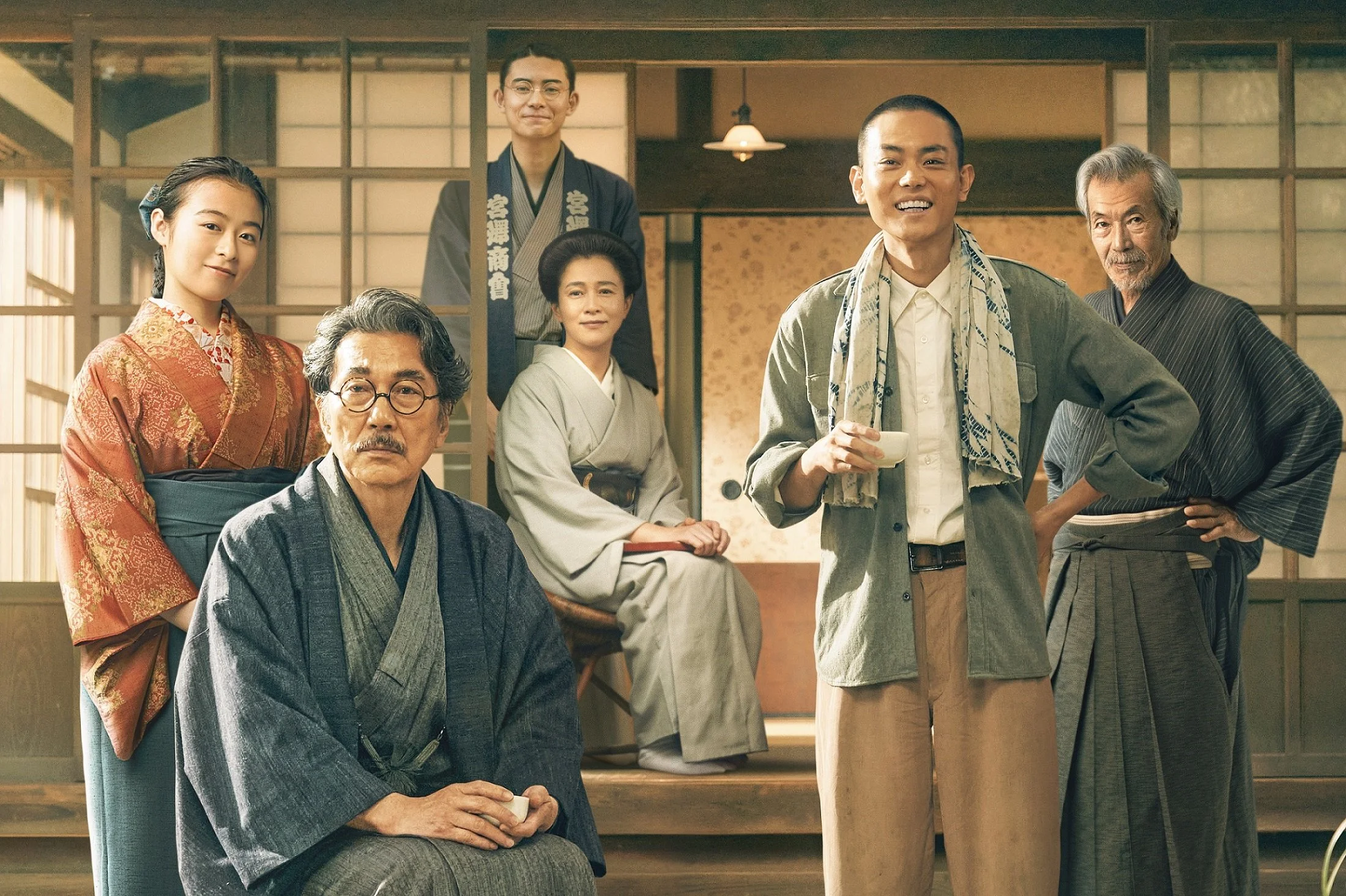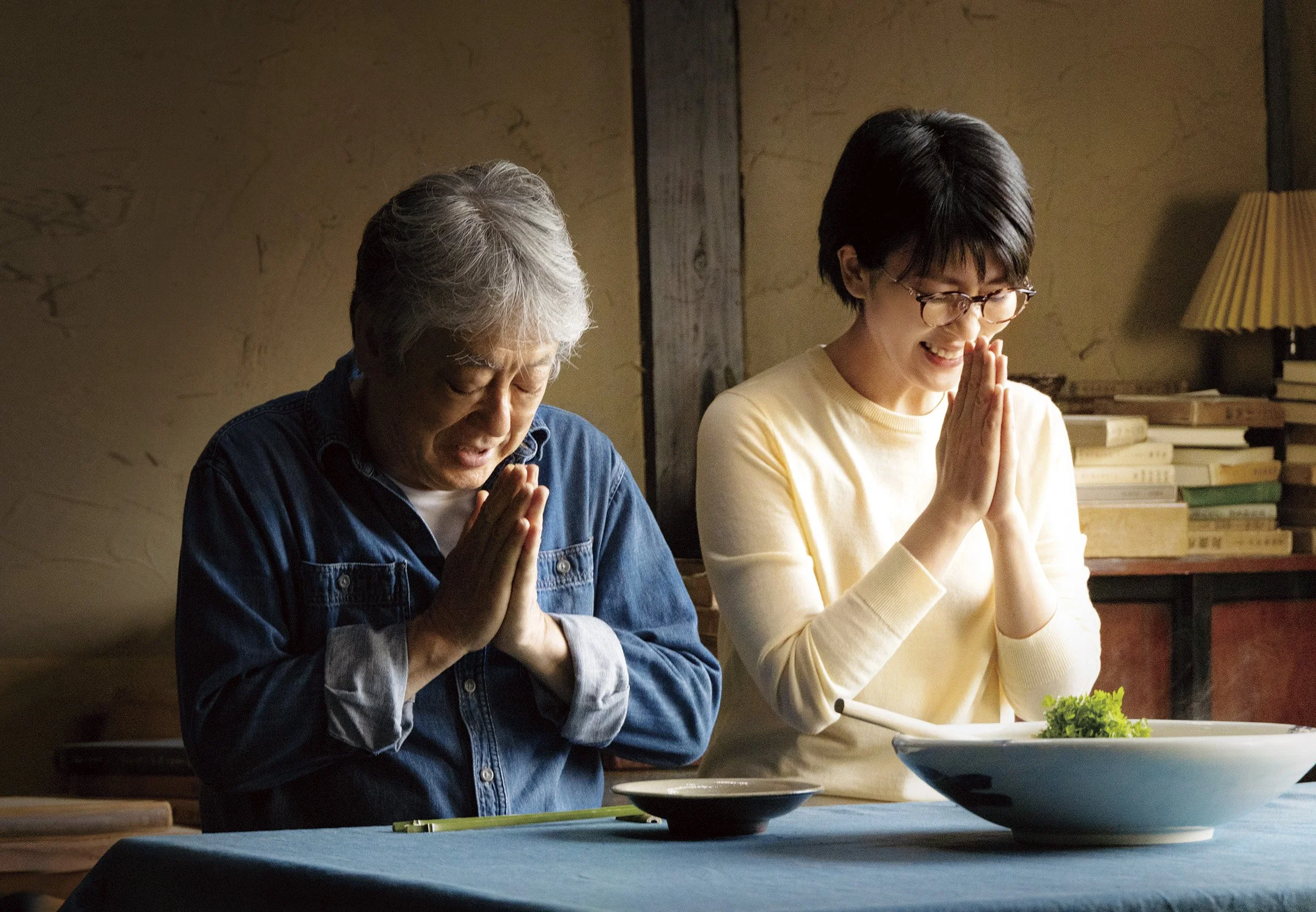Toronto Japanese Film Festival: Yes, they Cannes - Just in Time For an International Premiere
By Jim Slotek and Liam Lacey
The next best thing to seeing the best acting performance at Cannes just may be seeing the same actor at work in his follow-up film at the Toronto Japanese Film Festival.
Koji Yakusho recently took bows in front of the Croisette crowd, winning a best actor award for Wim Wenders’ Perfect Days. He was the first Japanese actor to win the award in 19 years.
The 67-year-old Yakusho also happens to star in Izuru Narushima‘s Father of the Milky Way Railroad, the opening night film at the Toronto Japanese Film Festival on Thursday, June 8
Screenings take place at Kobayashi Hall at the Japanese Canadian Cultural Centre through June 22.
Cannes winner Koji Yakusho (front left) and his movie family in Father of the Milky Way
Historical and traditional in theme, Father of the Milky Way Railroad is characteristic of the TJFF’s opening slot. It is putatively the story of Kenji Miyazawa (Masaki Suda). A novelist and poet who wrote for children, he died young and relatively unknown, and later became one of Japan’s best-loved authors.
In Narushima’s hands, Miyazawa’s story becomes a tender father-and-son tale, told mainly through the eyes of Masajiro Miyazawa (Yakusho), a career pawn-broker whose plan is to have his first-born son take over the generations-long family business.
Kenji, however, is what we now consider a failure-to-launch kid, whose passionate career plans change almost daily (farm management, Buddhist monk, etc.). He also seems to have an underlying mental condition. The only constant in his life is his beloved sister Toshi (Nana Mori), his sole audience for the stories he has penned throughout his life.
Tragedies befall the family, and Masajiro begins to understand his beloved-but-confounding son’s real talent. Father of the Milky Way Railroad is ultimately a story about a father committed to his troubled son, and driven by his belief in his talent.
Here’s a sampling of more of TJFF feature highlights, courtesy of Jim Slotek and Liam Lacey.
Kenji Sawada and Takaku Matsu prepare to eat a foraged feast in The Zen Diary
Friday, June 9, 7:00pm
Stories of forbidden love are a staple of romance fiction, but Wandering, based on a successful novel by Yu Nagira, takes that idea to an pervy extreme. On a rainy day in the park, a 19-year-old male college student, Fumi, provides an umbrella for a depressed nine-year-old girl, Sarasa, and takes her back to his apartment, where they live happily for two months before the police arrest him for kidnapping. Fumi, who feels tormented by his sexual attraction to underage girls, doesn’t act on those urges and Sarasa sees him as the real victim of the case. Fifteen years later, Sarasa spots Fumi, running his own café, and she begins to stalk him. When her controlling fiancé discovers her obsession, he beats her and she runs to Fumi for refuge. Korean cinematographer Hong Kyung-pyo (Burning, Parasite), Wandering has a dreamy, time-jumping style that hovers between melodrama and fantasy. LL
June 11, 7 pm
Based on a hit manga series by Kaori Tsurutani. BL Metamorphosis is a feel-good story of a friendship between a 75-year-old widow and a reclusive 17-year-old girl over their shared love of BL or “boy love” mangas, a genre of illustrated novels, mostly written by and for women, that focus on homoerotic love stories of teen-aged boys. When 75-year-old Ichinoi, who teaches calligraphy to children, drops into a local book store, she is intrigued by the drawings of idealized young men embracing. She asks the 17–year-old part-time clerk, Uhara, a secret BL fan, to tell her about the books. The fascination with BL manga is a source of shame for Uhara (fans of the genre are known as fujoshi or “rotten girls”) but the budding relationship helps empower her, as the older woman helps her appreciate the artistry of the genre. Uhara seeks the courage to pursue her own desire to be a manga creator, even helping inspire a professional manga writer who has a hit a creative slump. The unorthodox message here is girl power through boy love. LL
June 13, 7:00pm
An artful, character study, loosely based on the memoir of deaf woman boxer, Keiko Ogasawara, Slow, Small and Steady is a sports drama that dodges nearly all the sports movie clichés. Keiko is a young deaf woman who works as a hotel maid by day, shares a drab apartment with her brother and spends the rest of time training to fight. She took up boxing, we learn, because she was bullied at school. Now she spends all her free time at a family-run gym, under the tutelage of Mr. Sasaki (Tomokazu Mura), whose health is declining. The film is set during the COVID pandemic, which means the streets Keiko runs in are nearly empty and matches are held without cheering crowds. There is no musical score, though the sound of Keiko practicing combinations against Mr. Sasaki’s punching mitts have a tap dance rhythm. The matches, which are short and convulsively violent, are her most intimate human connection, in a film that balances its melancholy tone with some lovely grace notes, especially in the closing moments. LL
June 15, 7 p.m.
A monster at the Japanese Academy Awards – Best Film, Best Director, Best Screenplay, Best Actor, Supporting Actor and Actress – this adaptation of Keiichiro Hirano’s novel is a terrific, almost noir-ish tale of a young divorced single-mother named Rie (Sakura Ando), who finds a perfect husband in Daisuke (Masataka Kubota). When he dies in a job-related accident, it’s discovered he’d been impersonating the real Daisuke, and his actual identity is unknown. She hires a lawyer, Akira (Norio Komiura) to play detective and solve the ultimately heart rending mystery of the fake Daisuke. The film goes to dark corners, as it examines the nature of identity and an often fruitless search for happiness. My personal favourite of the fest. JS
June 17, 4 p.m.
After A Man, yet another film about lost identity and our choices of same. Jointly directed by Masahiko Sato, Yutaro Seki, and Kentaro Hirase, Roleless introduces us to Miyamatsu (Teruyuki Kagawa), a nondescript bachelor whose modest living consists of his job as a cable car operator and his work as in extra in Yakuza and Samurai films (he humble-brags that he has been “killed” as much as four times in a day). When he is recognized by an apparent stranger who claims to know him from another life, he follows his curiosity and meets his colleagues from a previous life as a taxi driver. He also meets a lost love and a jealous antagonist. As his memories seemingly return, we are left to wonder how much they really disappeared in the first place. A fascinating and deliberately ambiguous tale of self-discovery. JS
June 17, 7 p.m.
The title – adapted from Tsutomu Mizukami’s book - is no misnomer. This film is about a writer/semi-hermit named Tsutomu (Kenji Sawada) who subsists on delicious Buddhist dishes he creates from the edible fungi, plants and ferns that grow around him on a mountainside. And it is indeed a Zen-like experience. A widower, he still keeps his wife’s ashes in a place of honour. He makes a modest living as a writer of essays, and his editor/girlfriend Machiko (Takaku Matsu) is his only occasional visitor and taster. (He does look on his mother-in-law, who lives a similar hermitic existence in a nearby shack). But the movie’s raison d'être seems to be the lovingly shot cooking scenes, where each ingredient seems to be part of a ceremony. The scenery is breathtaking, and the culinary cinematography is mouth-watering. JS
June 18, 7 pm
A psychological thriller with a debt to The Silence of the Lambs, director Kazuya Shiraishi’s Lesson In Murder follows a depressed law student, Masaya Kakei, who receives a letter from a notorious serial killer, Yamato Haimura. Haimura is on Death Row for torturing and murdering 23 teenagers and one 26-year-old woman. As a child, Masaya knew the man, a gregarious local baker, beloved by children, and asks to visit him in prison. When they meet, Yamato insists he didn’t kill the woman, and invites the young man to solve the mystery for him. What follows is a procedural, with a chain of interviews, that leads back to Masaya’s own dysfunctional family and a complicated tale of multiple cases of child abuse, flashbacks to some hair-raisingly explicit torture scenes and long-winded explanations of victim grooming. The triumph here is the performance of Sadawo Abe, best known as a comedian, as the smiling psychopath with a fingernail fetish and a boundless enthusiasm for inflicting pain. LL




